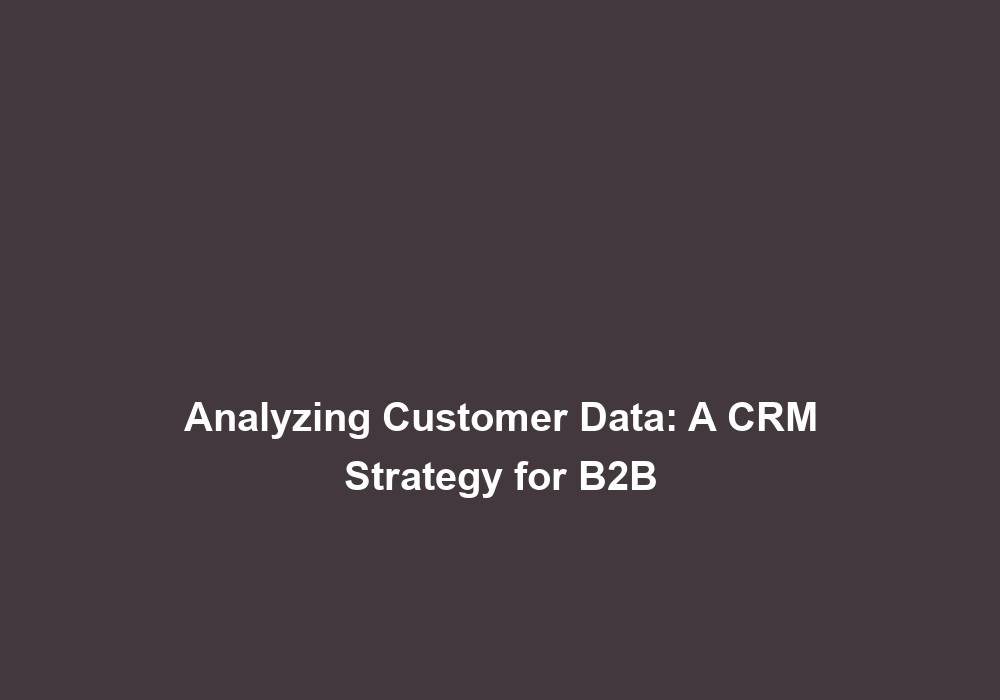In today’s highly competitive business landscape, building and nurturing strong relationships with customers is crucial for long-term success. This holds true not only for B2C companies but also for B2B organizations. To effectively manage B2B relationships and maximize customer satisfaction, leveraging Customer Relationship Management (CRM) software has become imperative. CRM software offers an array of powerful tools and features designed to streamline and enhance B2B relationship building. In this article, we will explore the various ways in which CRM software can be leveraged for effective B2B relationship building.
What is CRM Software?
CRM software is a technology-driven solution that enables businesses to manage and analyze customer interactions and data throughout the customer lifecycle. It serves as a central hub for storing customer information, facilitating communication, and tracking sales activities. By leveraging CRM software, B2B companies can effectively manage their customer relationships, gain valuable insights, and improve overall customer satisfaction.
CRM software provides a comprehensive set of features that streamline communication and collaboration within B2B organizations. With CRM, teams can easily access and share customer information, ensuring a unified and consistent approach towards customer relationship management. Whether it’s the sales team, marketing department, or customer support, everyone can access real-time data, notes, and communication history, allowing for a seamless customer experience.
Additionally, CRM software enables B2B companies to segment their customer base effectively. By categorizing customers based on various criteria such as industry, geographic location, or revenue potential, businesses can tailor their marketing and sales efforts to target specific customer groups effectively. This ensures that the right message reaches the right audience, leading to higher conversion rates and improved customer satisfaction.
Efficient Lead Management and Conversion
In the B2B world, effective lead management is crucial. CRM software provides powerful lead management capabilities, allowing businesses to track and nurture leads throughout the sales process. By automating lead scoring, lead assignment, and lead nurturing workflows, CRM software ensures that no opportunity falls through the cracks. It helps sales teams prioritize their efforts, focus on high-potential leads, and ultimately increase conversion rates.
Furthermore, data is the backbone of any successful business strategy, and CRM software plays a vital role in collecting and analyzing customer data. By tracking customer interactions, purchases, preferences, and behavior patterns, CRM software generates actionable insights that drive informed decision making. B2B companies can uncover trends, identify areas for improvement, and optimize their sales and marketing strategies based on real-time data, leading to better customer engagement and increased revenue.
Personalized Customer Experience
Personalization is key to building strong B2B relationships, and CRM software helps businesses deliver personalized customer experiences at scale. By capturing and storing detailed customer profiles, including preferences and past interactions, CRM software empowers sales and marketing teams to tailor their communication and offerings to meet individual customer needs. This level of personalization enhances customer satisfaction, fosters loyalty, and drives repeat business.
Moreover, CRM software automates routine tasks, freeing up valuable time for B2B professionals to focus on strategic initiatives and relationship building. From sending personalized email campaigns to generating sales reports, CRM software automates repetitive tasks, reducing human error and increasing efficiency. This automation not only saves time but also allows teams to deliver a consistent and timely customer experience.
Improving Customer Support and Service
Effective customer support and service are vital for B2B relationship building. CRM software offers robust customer service capabilities, enabling businesses to track customer inquiries, manage support tickets, and provide timely resolutions. By centralizing customer support data, CRM software ensures that customer issues are addressed promptly, resulting in higher customer satisfaction and stronger relationships.
In conclusion, leveraging CRM software is crucial for B2B companies aiming to build and nurture strong relationships with their customers. By streamlining communication, enhancing customer segmentation, automating routine tasks, and providing actionable insights, CRM software empowers businesses to deliver personalized experiences, increase customer satisfaction, and drive revenue growth. In today’s digital age, where customer relationships are paramount, implementing a CRM solution is a strategic choice that can provide a competitive edge in the B2B landscape.

Your insights on the significance of CRM software in B2B relationships are compelling. I’ve observed firsthand how a well-implemented CRM system can transform customer interactions, creating a more personalized experience that not only enhances satisfaction but also builds loyalty over time.
The emphasis on leveraging CRM software for B2B relationship building is indeed a critical perspective in today’s business landscape. As you pointed out, the ability to manage and analyze customer interactions is not just an organizational asset but a strategic necessity.